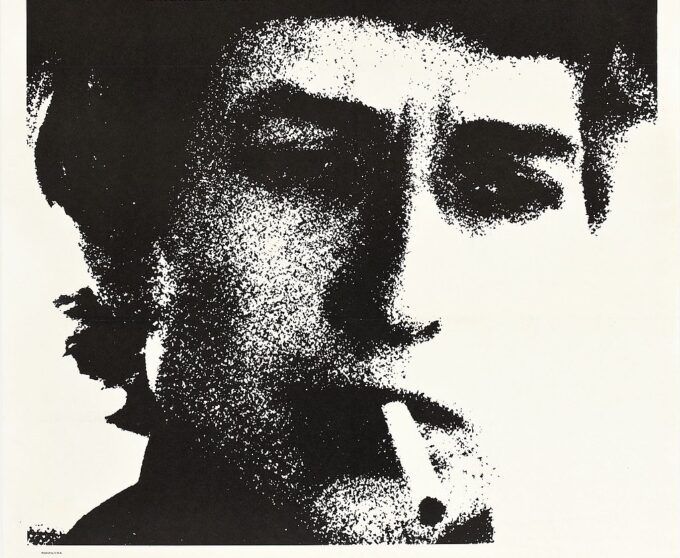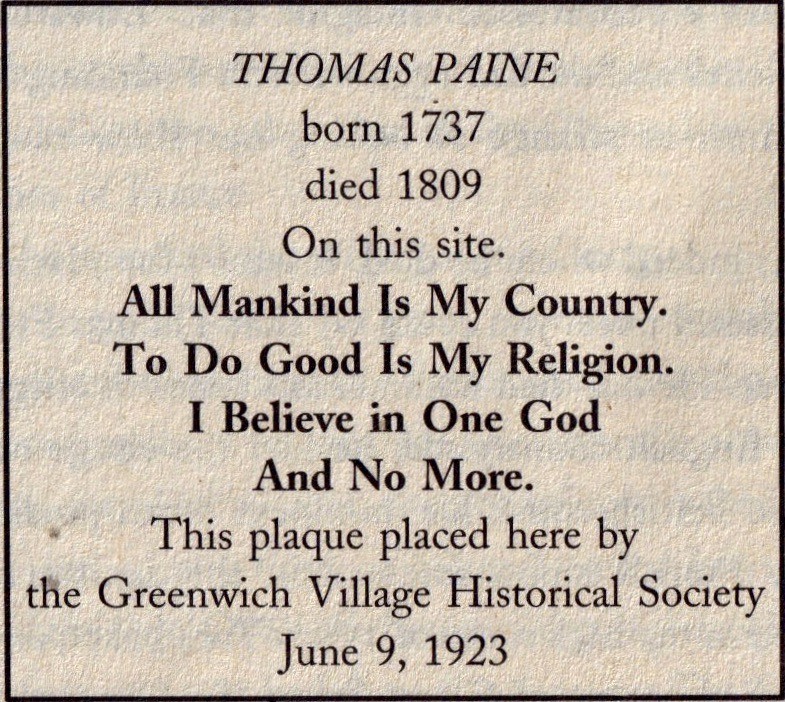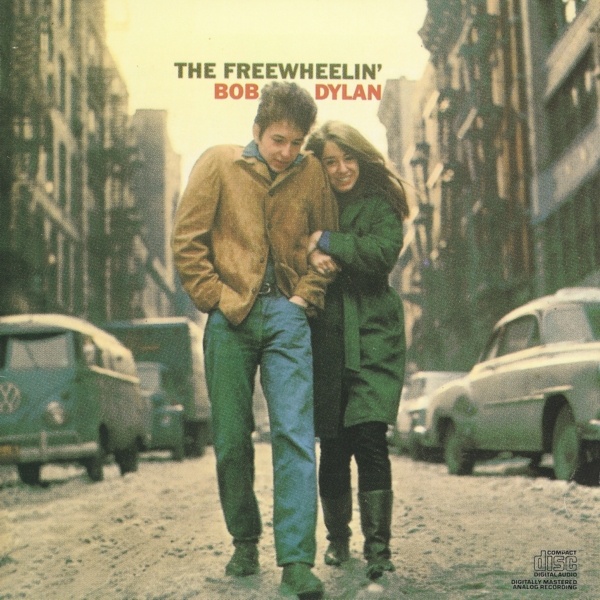
Image Source: The cinéma vérité documentary Dont Look Back – Public Domain
In “The Philosophy of Modern Song,” handsomely printed in the USA and just published by Simon & Schuster, Dylan describes and comments on 66 songs and the artists who made them. You might think the title sounds pretentious, but it’s not. He’s a serious musicologist and Academe better make room for him. Also, he’s a critic with a unique style. Every chapter provides facts about the singer and the performance and the production and the label, but above all, Dylan explains how the song hits you –or at least how it hits him. He rambles along to sudden, logical conclusions. His perspective is the opposite of coy. Even if you don’t know the songs, or can barely remember having heard them once or twice, the relevant background this book provides is fascinating in and of itself. And thought-provoking.
There are way too many great riffs to quote in this brief review. Here’s one: writing about Johnie Taylor’s song “Cheaper to Keep Her” (originally released on the album Tailored in Silk, Stax, 1973) Dylan asks: “How could it not be? Divorce is a ten- billion-dollar-a-year industry… If you’re lucky enough to get into this racket, you can make a fortune manipulating the laws and helping destroy relationships between people who at one point or another swore undying love to one another… Marriage and divorce are currently played out in the courtrooms and on the tongues of gossips; the very nature of the institution has become warped and distorted, a gotcha game of vitriol and betrayal. How many divorce lawyers are parties to this betrayal between two supposedly civilized people? The honest answer is all of them.”
With a tip of the hat to the editor of the AVA, I note that many of Dylan’s riffs about our society read like “Off the Record” items in tone and content… And here’s a chapter that couldn’t be included in the “Philosophy of Modern Song” because Dylan didn’t write it:
“As I Went Out One Morning” (released on the album John Wesley Harding, Columbia, 1967). A folkish ballad in a minor key, this song is doubly sad because it comes at you on two levels, the literal and the figurative. It’s a song about personal and political rejection. And there’s a twist: it’s the rejector who feels bad, not the rejected. The only emotion she shows is determination. He needs to extricate himself but she keeps holding on.
Earlier in the year the Beatles had released Sergeant Pepper’s Lonely Hearts Club Band, with a striking collage by Michael Cooper on the album cover. The Rolling Stones tried to trump it with a hologram on their elaborately orchestrated Satanic Majesties Request. John Wesley Harding come out in December in a seemingly simple black-and-white photo of Dylan and three men standing in the woods looking straight at the camera. Keen-eyed fans soon noticed that indented into the hat worn by the peaceful looking man at the left in the photo was someone pointing a gun with a long white barrel. And was that a tiny naked woman leaning into a bend in the tree trunk?
In December 1963 the Emergency Civil Liberties Committee had given Dylan its Tom Paine award “in recognition of distinguished service in the fight for civil liberty.” As ECLC Director Corliss Lamont wrote to the membership, “Bob Dylan has become the idol of the progressive youngsters of today, regardless of their political factions. He is speaking to them in terms of protest that they understand and applaud. The ECLC feels that it is urgent to recognize the protest of youth today and to help make it understood by the older generation.” Lamont attached a a rave review from the New York Times, documentation that Dylan was hip.

The ECLC was made up of lawyers politically to the left of the American Civil Liberties Union (which had been reluctant to defend Communist Party members). Dylan felt out of place at the fancy dinner in a midtown hotel ballroom. He had to give an acceptance speech to 1,400 well-dressed “progressives.” He sensed phoniness and corruption in the recirculated air. He desperately wanted to split but couldn’t, they were giving him an award. To overcome his inhibitions he drank too much. Then he told the crowd that they were old and classy and politically impotent. They booed him. He said “You can boo but… I’ve just got to tell you, man, the Bill of Rights is free speech.” He said he would accept the award on behalf of James Forman of the Student Non-Violent Coordinating Committee and Phil Luce and other Americans defying the US ban on travel to Cuba (both clients of Leonard Boudin and Victor Rabinowitz, alpha males of the ECLC).
Dylan had come to New York in ’61 to pay homage to Woody Guthrie and immediately, automatically started moving in lefty circles. In the Greenwich Village folk-music scene he was breathing the air around Tom Paine in more ways than one. For sure he walked down Grove Street and read the plaque on the building that said

There was revolution in the air around Tom Paine and it made you hallucinate. You heard chimes of freedom flashing, you had visions of equality and disarmament and social justice and maybe even free love. You went to sing for SNCC in Mississippi and a brown-skinned girl told you she was better than no one and no one was better than her. There you were, embracing the causes Woody had fought for, embracing the movement itself. You offered her your hand –you were seriously interested, you wanted to check her out, get to know her– but she took hold of your arm and would not let go. She insisted on possessing you. You were brilliant and charismatic and could command people’s attention. You had been recognized as a very valuable asset.
Suze Rotolo seemed to personify the movement at its best. She was artistic, gentle, beautiful, intelligent, the most erotic thing you’d ever seen. Her sister Carla disapproved of you because she knew you’d never be a Communist (with a capital C) and that you would always want other women. She must have thought she was protecting her little sister. People always have the fanciest reasons for what they do.
Suze must have winced when she first heard “As I Went Out One Morning” because on the Freewheelin’ album she’s holding you tightly by the arm, walking down the middle of Jones St. (a stone’s throw from Tom Paine’s old pad at 59 Grove). As the chilly afternoon wore on she became a little cynical about the amount of time, money and effort Columbia Records was investing to get the perfect shot. It was her first exposure to corporate excess. You did all the retakes without griping and she was surprised by the level of self-discipline, ambition, and practicality you showed.

In the last verse of “As I went out one morning” the sadness lifts a little. Tom Paine himself –a real revolutionary, not some fake-left lawyer– appears and commands the lovely girl to yield. Then he tells Dylan he’s sorry for what she’s done.
This song is about rejecting the fake left while still yearning for Common Sense, The Age of Reason and the Rights of Man. It’s as sad as can be.
This content originally appeared on CounterPunch.org and was authored by Fred Gardner.